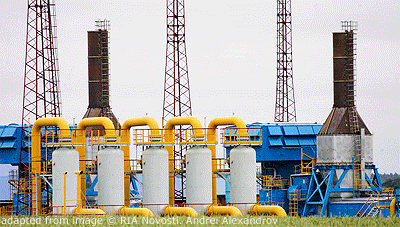A pipeline for peace? [Russia-Koreas Gas Pipeline]

file photo
A trilateral agreement for a gas pipeline project between Russia, South Korea and North Korea may herald a more peaceful environment on the Korean peninsula in the future.
Russia's Gazprom will start supplying gas through a 1,000 km long pipeline from the Far East to South Korea through North Korea's territory in 2017, according to an agreement signed between Moscow and Seoul following North Korea's approval.
Both presidents admitted that the project will be beneficial for all three nations in terms of economic gain and geopolitics. "This project will bring more peace to the Korean Peninsula," South Korea's president Lee said after the meeting with Dmitry Medvedev in St. Petersburg, RIA Novosti reported. Both sides of the deal also said that they will do their best to avoid any conflicts arising during the time of the construction and beyond. "Russia will take full responsibility for the management of threats to the passage of the gas pipeline through North Korea," Medvedev was quoted as saying by Chosun News. "Russia will be responsible if the gas supply is cut off." More stability? Russia's gas pipeline project was acknowledged by both politicians and experts as leverage to the settling of the situation on the Korean peninsula. When Medvedev and North Korean leader Kim Jong-Il held talks in August in Ulan-Ude, Buryatia, the latter agreed to Gazprom's plan to build a gas pipeline through his country's territory and assured Dmitry Medvedev that talks on the project will go on in the spirit of diplomacy, RIA Novosti reported. Hopes for a lasting peace on the Korean peninsula were shattered after a shoot-out between the North and South in November 2010. The six-party talks on the settlement of Pyongyang's nuclear program have also been in deadlock since 2009. "Mutual work on this project will help build more trust between North and South Korea and make their foreign policies more predictable, which therefore will reduce the tension on the peninsula," Alexander Zhebin, director of the Center for Korean Studies at the Institute of Far Eastern Studies in the Russian Academy of Sciences, told the Moscow News. However, other experts believe that the project will have little impact on the relationship between the two nations. "The gas pipeline will likely have a minimal impact on the situation on the Korean Peninsula," Troy Stangarone, senior director of Congressional Affairs and Trade at the Korea Economic Institute in Washington, told The Moscow News. "Despite earning a significant amount of hard currency from the Kaesong Industrial Complex, which employs nearly 50,000 North Koreans, North Korea still chose to provoke South Korea last year." "North Korea would likely seek to minimize the impact of any provocations on projects like the pipeline and Kaesong rather than refrain from them." Nuclear threat According to experts, North Korea's economy, having been in decline for the past two decades, has recently begun to recover. "With the failed currency reform behind it, North Korea's economy has begun to grow again," Stangarone said. "Over the last year, we've seen an increase in construction and economic activity as the regime prepares for the 100th anniversary of Kim Il-Sung's birthday in 2012," According to experts such as Stangarone, the main concern for Seoul has always been Pyongyang's nuclear program and the high activity around it. With the pipeline, North Korea will receive around $100 million each year. "One of the concerns whenever North Korea engages in a project that will earn it a substantial amount of hard currency is that it will use the funds to continue developing its nuclear programs... It would appear that North Korea currently has sufficient resources to develop it," Stangarone said. As much as North Korea's authoritarian political regime remains a mystery to the world, its economy is equally hard to understand. Some experts believe that Gazprom's pipeline may help North Korea deal with losing a lot of income after famous tourist destination project Kumgansan aimed largely at South Koreans was closed down in 2008 following the shooting of a South Korean tourist. "One of the North's motives to agree to the pipeline project was because it could allow Pyongyang to get a stable inflow of money again," said Zhebin, of the Center for Korean Studies.
Russia, Oil, Gas, Nuclear, Energy - Russia, Koreas, Far East - Russian News - Russia - Johnson's Russia List

